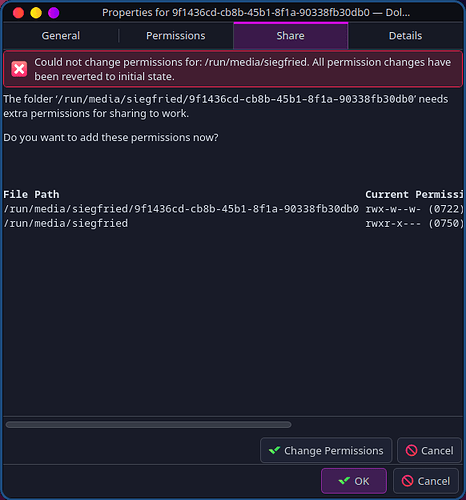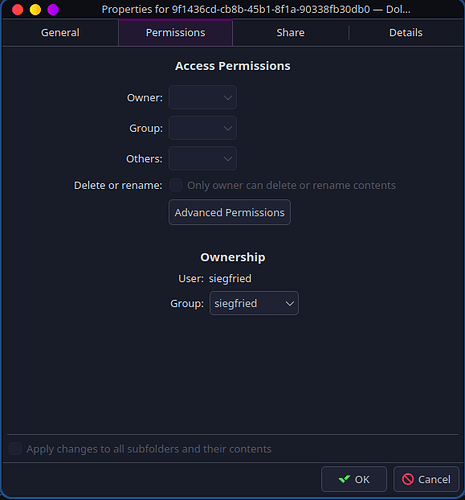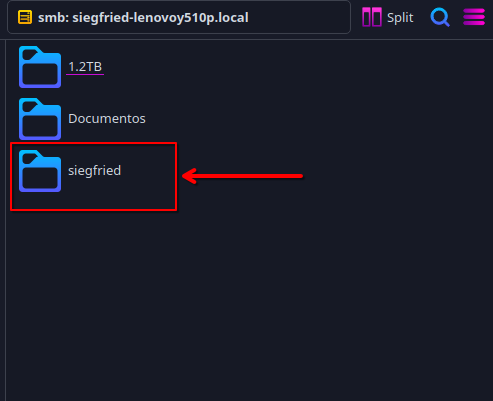Hi, I cannot fix share permissions in SMB. Also cannot change name of shared folders and shared folders disappear after reboot. Can you help me with this?
garuda-inxi
System:
Kernel: 6.12.25-1-lts arch: x86_64 bits: 64 compiler: gcc v: 14.2.1
clocksource: tsc avail: hpet,acpi_pm
parameters: BOOT_IMAGE=/@/boot/vmlinuz-linux-lts
root=UUID=1a7ee38a-d04e-4bf8-be1d-173f60129a28 rw rootflags=subvol=@
quiet resume=UUID=5755e619-40ee-4ef7-8518-70715ae30f0e loglevel=3 ibt=off
Desktop: KDE Plasma v: 6.3.4 tk: Qt v: N/A info: frameworks v: 6.13.0
wm: kwin_wayland vt: 1 dm: SDDM Distro: Garuda base: Arch Linux
Machine:
Type: Laptop System: LENOVO product: VIQYx v: INVALID
serial: <superuser required> Chassis: type: 10 v: INVALID
serial: <superuser required>
Mobo: LENOVO model: VIQY0Y1 v: 31900006WIN8 STD MBR IPG
serial: <superuser required> part-nu: LENOVO_BI_IDEAPAD
uuid: <superuser required> UEFI: LENOVO v: 74CN26WW(107T22)
date: 05/09/2013
Battery:
ID-1: BAT1 charge: 41.7 Wh (100.0%) condition: 41.7/56.4 Wh (74.0%)
power: 655.4 W volts: 12.2 min: 10.8 model: LENOVO PABAS0241231 type: Li-ion
serial: <filter> status: full
CPU:
Info: model: Intel Core i7-4700MQ bits: 64 type: MT MCP arch: Haswell
gen: core 4 level: v3 note: check built: 2013-15 process: Intel 22nm
family: 6 model-id: 0x3C (60) stepping: 3 microcode: 0x28
Topology: cpus: 1x dies: 1 clusters: 4 cores: 4 threads: 8 tpc: 2
smt: enabled cache: L1: 256 KiB desc: d-4x32 KiB; i-4x32 KiB L2: 1024 KiB
desc: 4x256 KiB L3: 6 MiB desc: 1x6 MiB
Speed (MHz): avg: 2395 min/max: 800/3400 scaling: driver: intel_cpufreq
governor: performance cores: 1: 2395 2: 2395 3: 2395 4: 2395 5: 2395 6: 2395
7: 2395 8: 2395 bogomips: 38322
Flags: avx avx2 ht lm nx pae sse sse2 sse3 sse4_1 sse4_2 ssse3 vmx
Vulnerabilities: <filter>
Graphics:
Device-1: Intel 4th Gen Core Processor Integrated Graphics vendor: Lenovo
driver: i915 v: kernel arch: Gen-7.5 process: Intel 22nm built: 2013 ports:
active: eDP-1 empty: HDMI-A-1,VGA-1 bus-ID: 00:02.0 chip-ID: 8086:0416
class-ID: 0300
Device-2: NVIDIA GK107M [GeForce GT 750M] vendor: Lenovo driver: N/A
alternate: nouveau, nvidia_drm, nvidia non-free: series: 470.xx+
status: legacy-active (EOL~2024-09-xx) arch: Kepler-2 code: GKxxx
process: TSMC 28nm built: 2012-2018 pcie: gen: 3 speed: 8 GT/s lanes: 8
link-max: lanes: 16 bus-ID: 01:00.0 chip-ID: 10de:0fe4 class-ID: 0300
Device-3: Realtek Lenovo EasyCamera driver: uvcvideo type: USB rev: 2.0
speed: 480 Mb/s lanes: 1 mode: 2.0 bus-ID: 1-1:2 chip-ID: 0bda:58b9
class-ID: 0e02 serial: <filter>
Display: wayland server: X.org v: 1.21.1.16 with: Xwayland v: 24.1.6
compositor: kwin_wayland driver: X: loaded: modesetting
alternate: fbdev,intel,vesa dri: crocus gpu: i915 display-ID: 0
Monitor-1: eDP-1 model: LG Display 0x033a built: 2011 res: mode: 1366x768
hz: 60 scale: 100% (1) dpi: 101 gamma: 1.2 size: 344x194mm (13.54x7.64")
diag: 395mm (15.5") ratio: 16:9 modes: 1366x768
API: EGL v: 1.5 hw: drv: intel crocus platforms: device: 0 drv: crocus
device: 1 drv: swrast gbm: drv: crocus surfaceless: drv: crocus wayland:
drv: crocus x11: drv: crocus
API: OpenGL v: 4.6 compat-v: 4.5 vendor: intel mesa v: 25.0.4-arch1.1
glx-v: 1.4 direct-render: yes renderer: Mesa Intel HD Graphics 4600 (HSW
GT2) device-ID: 8086:0416 memory: 1.46 GiB unified: yes display-ID: :1.0
API: Vulkan v: 1.4.309 layers: 10 device: 0 type: integrated-gpu
name: Intel HD Graphics 4600 (HSW GT2) driver: mesa intel v: 25.0.4-arch1.1
device-ID: 8086:0416 surfaces: xcb,xlib,wayland device: 1 type: cpu
name: llvmpipe (LLVM 19.1.7 256 bits) driver: mesa llvmpipe
v: 25.0.4-arch1.1 (LLVM 19.1.7) device-ID: 10005:0000
surfaces: xcb,xlib,wayland
Info: Tools: api: clinfo, eglinfo, glxinfo, vulkaninfo
de: kscreen-console,kscreen-doctor gpu: corectrl, nvidia-settings,
nvidia-smi wl: wayland-info x11: xdpyinfo, xprop, xrandr
Audio:
Device-1: Intel Xeon E3-1200 v3/4th Gen Core Processor HD Audio
vendor: Lenovo driver: snd_hda_intel v: kernel bus-ID: 00:03.0
chip-ID: 8086:0c0c class-ID: 0403
Device-2: Intel 8 Series/C220 Series High Definition Audio vendor: Lenovo
driver: snd_hda_intel v: kernel bus-ID: 00:1b.0 chip-ID: 8086:8c20
class-ID: 0403
Device-3: NVIDIA GK107 HDMI Audio vendor: Lenovo driver: snd_hda_intel
v: kernel pcie: gen: 3 speed: 8 GT/s lanes: 8 link-max: lanes: 16
bus-ID: 01:00.1 chip-ID: 10de:0e1b class-ID: 0403
API: ALSA v: k6.12.25-1-lts status: kernel-api with: aoss
type: oss-emulator tools: N/A
Server-1: PipeWire v: 1.4.2 status: active with: 1: pipewire-pulse
status: active 2: wireplumber status: active 3: pipewire-alsa type: plugin
4: pw-jack type: plugin tools: pactl,pw-cat,pw-cli,wpctl
Network:
Device-1: Qualcomm Atheros QCA8171 Gigabit Ethernet vendor: Lenovo
driver: alx v: kernel pcie: gen: 1 speed: 2.5 GT/s lanes: 1 port: 3000
bus-ID: 08:00.0 chip-ID: 1969:10a1 class-ID: 0200
IF: enp8s0 state: down mac: <filter>
Device-2: Broadcom BCM4352 802.11ac Dual Band Wireless Network Adapter
vendor: Lenovo driver: wl v: kernel modules: bcma pcie: gen: 2 speed: 5 GT/s
lanes: 1 bus-ID: 09:00.0 chip-ID: 14e4:43b1 class-ID: 0280
IF: wlp9s0 state: up mac: <filter>
Info: services: NetworkManager, smbd, systemd-timesyncd, wpa_supplicant
Bluetooth:
Device-1: Lite-On BCM20702A0 driver: btusb v: 0.8 type: USB rev: 2.0
speed: 12 Mb/s lanes: 1 mode: 1.1 bus-ID: 1-7:4 chip-ID: 04ca:200b
class-ID: fe01 serial: <filter>
Report: btmgmt ID: hci0 rfk-id: 2 state: up address: <filter> bt-v: 4.0
lmp-v: 6 status: discoverable: no pairing: no class-ID: 6c010c
Drives:
Local Storage: total: 2.27 TiB used: 885.85 GiB (38.0%)
SMART Message: Unable to run smartctl. Root privileges required.
ID-1: /dev/sda maj-min: 8:0 vendor: Crucial model: CT500MX500SSD1
size: 465.76 GiB block-size: physical: 4096 B logical: 512 B speed: 3.0 Gb/s
tech: SSD serial: <filter> fw-rev: 023 scheme: GPT
ID-2: /dev/sdb maj-min: 8:16 vendor: Crucial model: CT2000MX500SSD1
size: 1.82 TiB block-size: physical: 4096 B logical: 512 B speed: 6.0 Gb/s
tech: SSD serial: <filter> fw-rev: 023 scheme: GPT
Partition:
ID-1: / raw-size: 100.42 GiB size: 100.42 GiB (100.00%)
used: 20.88 GiB (20.8%) fs: btrfs dev: /dev/sdb4 maj-min: 8:20
ID-2: /boot/efi raw-size: 1.86 GiB size: 1.86 GiB (99.80%)
used: 608 KiB (0.0%) fs: vfat dev: /dev/sdb1 maj-min: 8:17
ID-3: /home raw-size: 309.96 GiB size: 309.96 GiB (100.00%)
used: 174.17 GiB (56.2%) fs: btrfs dev: /dev/sdb5 maj-min: 8:21
ID-4: /var/log raw-size: 100.42 GiB size: 100.42 GiB (100.00%)
used: 20.88 GiB (20.8%) fs: btrfs dev: /dev/sdb4 maj-min: 8:20
ID-5: /var/tmp raw-size: 100.42 GiB size: 100.42 GiB (100.00%)
used: 20.88 GiB (20.8%) fs: btrfs dev: /dev/sdb4 maj-min: 8:20
Swap:
Kernel: swappiness: 133 (default 60) cache-pressure: 100 (default) zswap: no
ID-1: swap-1 type: zram size: 15.34 GiB used: 0 KiB (0.0%) priority: 100
comp: zstd avail: lzo-rle,lzo,lz4,lz4hc,deflate,842 max-streams: 8
dev: /dev/zram0
ID-2: swap-2 type: partition size: 20.12 GiB used: 0 KiB (0.0%)
priority: -2 dev: /dev/sdb3 maj-min: 8:19
Sensors:
System Temperatures: cpu: 73.0 C mobo: N/A
Fan Speeds (rpm): N/A
Info:
Memory: total: 16 GiB note: est. available: 15.35 GiB used: 4.82 GiB (31.4%)
Processes: 304 Power: uptime: 6m states: freeze,mem,disk suspend: deep
avail: s2idle wakeups: 0 hibernate: platform avail: shutdown, reboot,
suspend, test_resume image: 6.07 GiB services: org_kde_powerdevil,
power-profiles-daemon, upowerd Init: systemd v: 257 default: graphical
tool: systemctl
Packages: pm: pacman pkgs: 1841 libs: 546 tools: octopi,paru Compilers:
clang: 19.1.7 gcc: 14.2.1 Shell: garuda-inxi default: fish v: 4.0.2
running-in: konsole inxi: 3.3.38
Garuda (2.7.2-1):
System install date: 2025-03-01
Last full system update: 2025-04-25
Is partially upgraded: No
Relevant software: snapper NetworkManager dracut nvidia-dkms
Windows dual boot: No/Undetected
Failed units:


